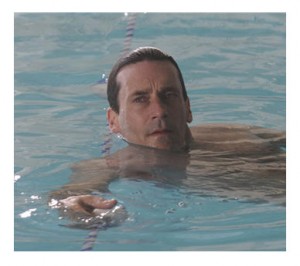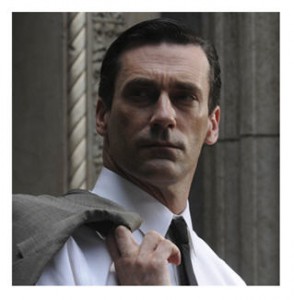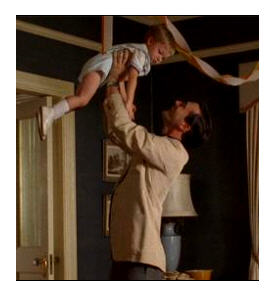Just when I think the mood, the storytelling, the performances, the surprise of it all can’t get any better – I am seduced. Again.
 Last evening’s Mad Men took on Don’s inner world – not through observation – but inner dialog, supplemented by various views of our hero as the summer of 1965 begins.
Last evening’s Mad Men took on Don’s inner world – not through observation – but inner dialog, supplemented by various views of our hero as the summer of 1965 begins.
Who can resist dipping inside the psyche of a complicated anti-hero? Who doesn’t want to know more about this wounded, proud, deceptive, reinvented man?
The power of inner dialog
We love it in novels. We love it in film. When allowed to enter the first person view, the journal, the thoughts, the sensation of rumbling around inside a character’s experiences – we are drawn closer to the backbone of the story. We’re more sympathetic, more conflicted, more emotionally engaged.
“The Summer Man” begins with Don struggling to do laps at the New York Athletic Club. He’s winded and coughing when he reaches the edge of the pool. There is a poignant shot of him slumped on the bench in the locker room afterward – everything in his body language screams fatigue, depression, his sense of defeat.
Then he appears in his dingy apartment, writing by the window. We don’t take Don for a man who is introspective about his behaviors or his life; of course, he’s been covering up – even from himself – through alcohol, women, work. And so he begins, with more honesty than we expect:
They say as soon as you have to cut down on your drinking, you have a drinking problem. My mind is a jumble. I can’t focus my thoughts.
Revelations
Don goes on to write, somberly:
I’ve never written more than 250 words – 5 paragraphs 50 words each. Not even in high school. I should have finished high school. Everything could’ve been different. God I was lazy.
 This is not a man who is cutting himself slack. He is facing demons. Finally. And throughout the remainder of the episode, we experience him doing so, even to the backdrop of shenanigans from the Creative team at Sterling Cooper Draper Pryce, bad behavior from Betty (new hubby Henry takes note), a raw and irritable Joan (her husband is preparing to leave for basic training, with Vietnam increasingly in the news).
This is not a man who is cutting himself slack. He is facing demons. Finally. And throughout the remainder of the episode, we experience him doing so, even to the backdrop of shenanigans from the Creative team at Sterling Cooper Draper Pryce, bad behavior from Betty (new hubby Henry takes note), a raw and irritable Joan (her husband is preparing to leave for basic training, with Vietnam increasingly in the news).
Yet Don remains the focal point of this episode, moderating his drinking, choosing to say no to excess, persevering through his morning laps. He is trying to define what he wants, to make a list, and we’re struck by the fact that he can’t seem to go beyond two things. Even in that, he’s stymied.
He wants to climb Killamanjaro, and
. . . to gain a modicum of control over the way I feel.
He floats in the pool. He is listening to his inner voice. He is trying to find clarity. Throughout the episode, we see him moving forward, making better decisions. Slipping back a little, then advancing again. It is hard work, like his daily swim – a balance of weight and floating, movement and rest.
Elegant seduction
 Mad Men writers, set designers, costumers et al certainly know how to seduce their viewers. And Jon Hamm as Don Draper gives another fine, restrained performance in this episode. Guard up, guard down, the notable differences as he interacts with two women – each of whom offers herself to him in the back seat of a cab.
Mad Men writers, set designers, costumers et al certainly know how to seduce their viewers. And Jon Hamm as Don Draper gives another fine, restrained performance in this episode. Guard up, guard down, the notable differences as he interacts with two women – each of whom offers herself to him in the back seat of a cab.
We see Don as the lonely man, the distant man, the dismissive man, Don as the father who accepts that another man is raising his son – is distressed by it – yet doesn’t fight it.
A dark, sexy mood ripples through this episode, as does Don’s time deep in thought, writing out pages as he examines his days and his motives, pushing to get stronger. We see Betty’s view of him through her bitterness (and desire). We see Henry’s perception through his jealousy. We see the SCDP team, most of whom don’t discern a difference – or who simply accept his slide into alcoholism which he is now trying to halt. There is Peggy – who sees a great deal, including more of the man Don is.
The brilliance of Mad Men
There are always women around Don – drawn to the powerful, confident, good-looking persona he has created. Yet the man himself is increasingly aware that he isn’t seen for who he is, that he has only so much to give – for now.
We’re inside his inner dialog once again, as he writes about his date, Bethany, her romanticized view of him, and her inability to see his disinterest.
People tell you who they are but we ignore it, because we want them to be who we want them to be.
The next morning, Don is sprawled across his bed. It is a lonely, isolating shot. We hear his thoughts:
I like sleeping alone, stretching out like a sky diver.
This is the brilliance of Mad Men. This dark poetry, Don’s sense of falling, floating, and stretching, all at the same time. It is a part of being lost and changing, of rebuilding a sense of identity. For Mad Men’s hero, this is a painful period; he’s grateful that he’s alone, sorrowful that he’s alone, understanding that for now, he must be alone.
 In the final scene, as Betty has relented (in self-interest), Don arrives at baby Gene’s birthday party, holds up the two-year old with something like happiness and relief. The child hardly seems to know him. We imagine Don’s mixed emotions, even in this bittersweet moment.
In the final scene, as Betty has relented (in self-interest), Don arrives at baby Gene’s birthday party, holds up the two-year old with something like happiness and relief. The child hardly seems to know him. We imagine Don’s mixed emotions, even in this bittersweet moment.
Images courtesy AMCTV.com. Read more Mad Men musings and recaps.
That show totally rocks, doesn’t it? It’s funny, when the show began, I remember feeling sorry for Betty, and now I just cannot stand her!
Totally rocks, Kitch. You’re right. (I’m sure we’ll be seeing more of Betty’s inner world, too. Though what a mean bitch she’s been. It’s clear she still cares for Don – or maybe simply hates that he doesn’t seem to be mooning over her? And the way she uses the kids to dig the knife in deeper makes me ill. But Henry’s on to her. She’s got a bumpy road ahead. We know it.)
The comment about other people seeing what they want to see over who we are is interesting – I often wonder how often that is true – and then how often do we not attempt to change it or do we try and be the person that they see over the person that we are?
Wonderful questions, TE. Don’t you think we all see what we want to see – to a large degree? Especially when we are attracted to someone, or love them?
Your question – how often do we not attempt to change their perception – is a provocative one. Do we bask in another’s view of us if it is self-serving? Even benignly so? If it is a reflection we prefer to the one we see in the mirror?
I don’t have an answer. What do you think? Is it natural? Is it harmful?
Thought provoking. I do believe people see what they want to see – both in ourselves and in our loved ones. Then there are the people who look for something negative to bring a person down as a self-serving way to hold themselves in higher esteem or to detract from their own inadequacies.
Do we ever accept people for who they are? For that matter, do we accept who we are ? I don’t know the answer to these questions, but I think these are interesting questions that Mad Men raises.
If some of us accept that we are constantly evolving, and capable of change – presumably that would include changing our ability to see ourselves? And others?
But we become our masks; we’re expected to do so. I think part of the cultural rebellion of the late sixties was against those outer trappings that were so important previously (and have become important again since the 80s). It will be interesting to watch Mad Men tackle that. And I wonder how much our society squeezes out our ability to really look inward. We’re so busy just trying to get through the day, you know?
And then I think about writing. About this sort of writing – this dialog – this community. And I think that for some, it is an opportunity for that sort of opening and introspection. There’s hopefulness in that.